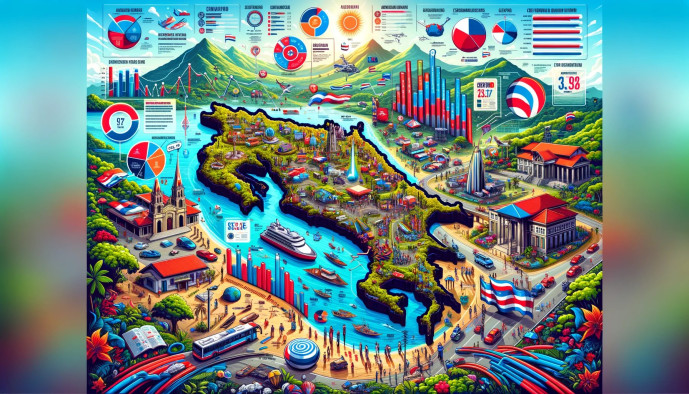Key Facts of Costa Rica: Demogragphy, Population, Economy, Politics, etc…
Discover Costa Rica's vibrant demographics, robust economy, and political landscape.

Population & Demographics
Key Figures
- Population: Approximately 5.2 million people.
- Capital City: San José, with a metropolitan area population of over 2 million.
- Population Density: One of the most densely populated countries in Central America, with most people living in the Central Valley.
- Median Age: Around 34 years old.
Ethnic Composition
The cultural tapestry of Costa Rica is rich and varied. The population is predominantly of European (primarily Spanish) and Mestizo (mixed European and Indigenous) descent. You will also find significant Afro-Caribbean communities, which have profoundly shaped the culture on the Caribbean coast, especially in areas like Limón. Small but culturally important Indigenous communities, such as the Bribri and Cabécar, maintain their traditions and languages. In recent decades, a growing expatriate community from North America and Europe has also added to the country’s diverse character.
Language & Religion
- Official Language: Spanish is the official language. Many visitors find the local Spanish to be particularly clear and relatively easy to understand.
- English: In destinations frequented by travelers, as well as in most hotels and restaurants, English is widely spoken, facilitating smooth communication.
- Official Religion: Roman Catholicism is the state religion, though the constitution guarantees freedom of religion for all, and a diversity of faiths are practiced openly.
Government & Politics
A Stable Democracy
Costa Rica is a Democratic Republic with a robust system of constitutional checks and balances. For travelers, this translates into a secure and predictable environment. The nation is widely regarded as the most stable and peaceful country in Latin America, a testament to its long-standing commitment to democratic principles and social peace.
A Country Without an Army
A defining feature of the Costa Rican identity is the abolition of its military in 1948, a profound point of national pride. This landmark decision constitutionally redirects funds that would have been used for military spending toward vital public services, including education, healthcare, and the protection of the nation’s extraordinary natural environment.
Economy & Industry
Economic Overview
Considered an upper-middle-income developing country, Costa Rica has built a resilient economy with a strong focus on sustainability. Over the past few decades, it has successfully transitioned from a primarily agricultural economy to a more diversified model based on services, technology, and high-value exports.
Key Economic Sectors
- Tourism: A primary driver of the economy, the country has distinguished itself by focusing on ecotourism and adventure travel, leveraging its immense biodiversity.
- Technology & Services: Costa Rica has become a major hub for foreign investment, particularly in the fields of medical device manufacturing, pharmaceuticals, and technology services.
- Agriculture: This remains a vital sector, renowned for its high-quality exports. The country is famous for its exceptional coffee, as well as bananas, pineapples, and ornamental plants.
Currency
The official currency is the Costa Rican Colón (CRC). However, US Dollars are widely accepted in most tourist areas, including hotels, tour companies, and many restaurants. For detailed information on exchange rates, using ATMs, and credit card acceptance, please refer to the ‘Currency & Money Matters’ section of this toolkit.
Society & National Identity
Education & Healthcare
Social investment is a cornerstone of Costa Rican policy. The nation boasts one of the highest literacy rates in Latin America, at over 97%, a result of a public education system that is both free and mandatory for all citizens. Furthermore, its high-quality, universal public healthcare system is a source of national pride and contributes to a life expectancy that is among the highest in the world.
“Pura Vida” Philosophy
“Pura Vida,” or “Pure Life,” is far more than a simple saying; it is a philosophy deeply ingrained in the national identity. It embodies a laid-back optimism, a sense of gratitude, and an appreciation for a simple, stress-free life. Be prepared to hear this ubiquitous phrase used as a friendly greeting, a warm farewell, and as a positive affirmation that everything is great.
Environmental Leadership
Costa Rica is a celebrated world leader in environmental conservation and sustainable practices. This commitment is evident across the country, where over 25% of the land is protected within a network of national parks and reserves. The nation is actively pursuing ambitious environmental goals, including its aim to become one of the world’s first carbon-neutral countries.